Perhaps the biggest in business terms, Manchester United have fans from Manchester to Manchuria and are probably the most well-known football club in the world. From humble beginnings at the end of the nineteenth century to the industry that it is today, the club has had many ups and downs not the least of which was the Munich air disaster when the most promising team of the 1950's was almost entirely wiped out. Against this the fighting spirit and hardiness that has always characterised English football showed itself. Here we take a short look at the recent history of this most emblematic club.
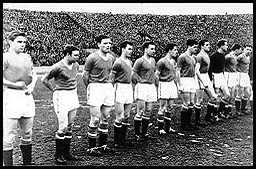
"The Busby Babes" 1958
After building one of the greatest teams seen in England, Matt Busby had to start all over again at the start of the 1960's. However, once he had recovered from his own injuries, he started to build worthy of its predecessors.
In 1959/60, the Munich survivor Denis Viollet broke Jack Rowley's club record by scoring 32 goals in one league season. Other notable survivors included Bobby Charlton, who came through the club's youth ranks to break goalscoring records for club and later country. Nobby Stiles followed the same path, from youth team to first team, while Denis Law came via the more direct route, by record £115,000 transfer from Torino. Everything came together with a run to Wembley for the 1962/63 FA Cup Final. Matt Busby's new-look team beat Leicester City 3-1, with two goals from David Herd and one by Denis Law.
The next season saw Manchester United build on the foundations of success to challenge for the title, finishing second to Liverpool. The 1962/63 season was also notable for the signing and debut of George Best, the young man from Belfast who would become football's first superstar. His incredible skill, pace and control left opponents in knots.
In 1964/65, the famous trio of Best, Law and Charlton took United to new heights. They won the League Championship, beating Leeds on goal difference, and reached the semi-finals of the European Fairs Cup and the FA Cup. Law plundered goals galore and was named the European Footballer of the Year.
The title-winning team seemed to be almost perfect but they rested on their laurels during the next season, 1965/66, losing the title to Liverpool again and finishing fourth. Two cup runs, with United losing in the semi-finals of both the FA and European Cups, seemed to have tired them at the end of the season, however there was the memorable 5-1 thrashing of Benfica in the European Cup quarter-finals to savour, when Best had been in blistering form.
In 1966/67 United were crowned League Champions again, with Law scoring 23 goals in 36 games. The title success secured another season of top-level European football in 1967/68. Hibernians, FK Sarajevo, Gornik Zabrze and Real Madrid were swept aside as the Reds marched towards the European Cup final at Wembley. Benfica put up a good fight in the final. Jaime Graca equalised Charlton's headed goal to take the game into extra-time; in fact Benfica might have won the match in normal time had Alex Stepney not saved superbly from Eusebio. Best, Brian Kidd and Charlton ruled the next half-hour, scoring one goal each to destroy the Portuguese champions 4-1. The European Cup was heading to Old Trafford for the first time. Just 10 years after Sir Matt had seen his dream team destroyed by tragedy, he had performed the impossible. He was knighted soon afterwards.

European Champions 1968
Despite an anti-climatic end to the decade, fans could feel delighted with the 1960's. Most people Sir Matt Busby fully deserved his retirement which he announced at the end of 1969.The seventies started then, with memories of the European Cup triumph beginning to fade and attention focused on the search for a new manager. The next one of note was Tommy Docherty. His first challenge was to keep the team in the First Division while gradually replacing the legends of the 1960's. Sir Bobby Charlton announced he would retire at the end of the 1972/73 season, George Best was becoming erratic and Denis Law was passed his peak.
Some of Docherty's more unlucky predecessors must have felt aggrieved when he was spared the sack after taking United down. But to Docherty's credit, the Reds bounced back very quickly. They won the Second Division Championship in 1974/75, with top scorer Stuart 'Pancho' Pearson scoring 17 league goals. Lou Macari scored the goal that clinched promotion, at Southampton on 5 April 1975.United then reached two successive FA Cup finals, losing to Southampton in 1976, but then returning twelve months later to beat Liverpool 2-1 who were the dominant force in European football by this time.
However Docherty's fortunes could not last and after a very up and down period under Dave Sexton, the charismatic Ron Atkinson arrived. His new acquisitions really excited the fans. He broke the British transfer record to recruit Bryan Robson from his old club West Bromwich Albion for £1.5m.In midfield the new arrivals wonderfully complemented the finesse of Ray Wilkins, the ball-playing England star. United however missed a top-class forward who could match the strike rate of Ian Rush at Liverpool, who again won the Championship in 1982, 1983 and 1984. Atkinson's men were never far behind, finishing third or fourth in every season of his reign. .The domestic cups offered United their best chances of silverware and in 1983 United who stormed to a 4-0 replay win against Brighton with goals from Robson (2), Arnold Muhren and Norman Whiteside. This man's habit of rising to the big occasion was never more gratefully received than in 1985, when he curled in the only goal of the FA Cup Final to beat Everton 1-0. It was Atkinson's second FA Cup success in three seasons, but eighteen months later he became the fourth successive boss to be sacked, for his inability to break Liverpool's dominance of the First Division League Championship.
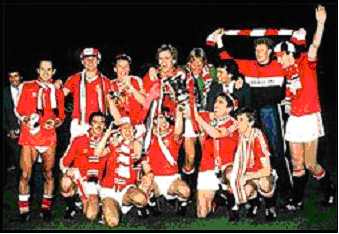
FA Cup winners 1983
In November 1986, Manchester United at last appointed a proven winner and so began the era of "Fergie". As Aberdeen manager, Alex Ferguson claimed every prize that Scotland had to offer, not to mention the added bonus of the European Cup Winners Cup when beat Real Madrid. He clearly had the skills for the job, but he also needed time to turn United round. The club remained patient as the Reds finished eleventh in 1986/87 and again in 1988/89. After all, the season in between, 1987/88, had offered encouraging signs as United finished second to Liverpool by winning eight and drawing two of their last ten games.
This early promise was soon to be rewarded. The dawn of the 1990's saw Alex Ferguson collecting his first silverware as Manchester United manager, and Liverpool winning their last League Championship with an ageing team. Fergie's first FA Cup, achieved after a replay against Crystal Palace, and seemed at the time to be a stand-alone success, one that possibly saved his job after another poor season in the League. But nine years later, it seemed that Lee Martin's winning goal against Palace lit the fuse for an explosion of unprecedented success.
First and foremost, winning the FA Cup in 1990 allowed United to make their return to European competition after an absence of five years. Far from being out of touch, they went all the way to the final of the European Cup Winners Cup in Rotterdam where their opponents were Barcelona, the former club of United striker Mark Hughes. Two goals by Hughes sealed the match 2-1 in Fergie's favour in May 1991, 23 years after the club's previous triumph in Europe.
The other long wait, for that elusive League Championship, very nearly ended in April 1992. The Reds had already won Fergie's third trophy in March, the League Cup, and were in a two-horse race with Leeds. Liverpool were out of the running, but they still had a say in the destiny of the title, beating United 2-0 at Anfield to ruin their challenge.
The 1991/92 title would be remembered in Manchester as the title that United lost, rather than the one that Leeds actually won, especially after they sold their star player at the end of the season. When Eric Cantona arrived at Old Trafford, he practically brought the League Championship with him. The Frenchman possessed that little extra bit of magic that had been missing from United's previous campaigns and was an instant hit with the Mancunian faithful, scoring nine goals to help the Reds win their first title in 26 years.
In the following season 1993/94, the team virtually picked itself en route to a historic League and FA Cup Double, with Cantona sporting the number seven shirt that used to belong to Bryan Robson's property. The number one, meanwhile, was undoubtedly Peter Schmeichel, the best goalkeeper ever seen at Old Trafford.
Cantona's eight-month absence from January 1995, following his clash with a fan at Crystal Palace, proved too much for United as they tried to defend their Double. They lost the title by one point to Blackburn Rovers and then lost the FA Cup final by one goal to Everton. The former champions were hampered at Wembley by an injury to Steve Bruce, the brave captain who was a defensive rock in the early 1990's.
Bruce also missed the following year's FA Cup Final, at the end of the 1995/96 season, but this time the result was rather different. Liverpool stood between United and a first-ever 'Double Double' and were holding out for extra-time, when Cantona struck home a sublime shot in the 86th minute. The French skipper had throughout the season been an inspiration to the talented young players in the team, including David Beckham and Gary Neville.
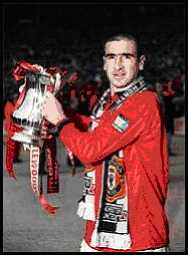
Eric Cantona FA Cup winner 1996
In May 1997, Cantona helped the club to its fourth League Championship of the decade. It was to be his last, as he surprisingly retired from football later that same month. The shock waves of Eric's decision seemed to last for a whole year, as the Reds went empty-handed in 1997/98 while Arsenal won the Double. Again, injuries to key players, especially Ryan Giggs and Roy Keane were cited for United's downfall. The influence that Giggs could have on results was never more apparent than in the 1998/99 FA Cup semi-final replay, when he scored perhaps the goal of the decade - a solo run and finish that left Arsenal's defenders grasping at thin air. It booked United's place in their fifth FA Cup final of the 1990's, and this time they won it, beating Newcastle United 2-0 with goals by Paul Scholes and substitute Teddy Sheringham.
That result clinched United's third Double, six days after the Premiership title had been wrapped by Andy Cole's goal against Tottenham at Old Trafford. But still there was more to come from a remarkable campaign. After an epic Champions League semi-final against Juventus, when Keane inspired the team to fight back from 2-0 down in the second leg, United marched into an epic final against Bayern Munich in Barcelona. United's attempts to win the European Cup for the first time since 1968 looked to be doomed when Bayern took an early lead through Mario Basler and defended it with typical German resilience. But then, in injury time, the Reds produced one of the most stunning revivals in sporting history - Sheringham equalised, and moments later his fellow substitute Ole Gunnar Solskjaer fired in the winner to make the score 2-1. United had won the Treble; their manager Alex Ferguson was subsequently knighted as his fans around the globe basked in the glory. The Treble became a quadruple later in the year when Sir Alex Ferguson's men travelled to Tokyo to compete for the Inter-Continental Cup. Keane's goal against Palmeiras of Brazil bestowed upon United the title of World Club Champions. Officially, at the end of the millennium, the biggest football club in the world had also become the best in the world!
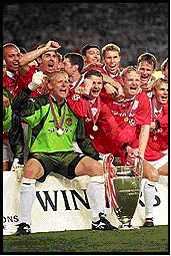
European Champions 1999
Manchester United started the new decade, century and millennium in typical pioneering fashion. They entered a brand new competition - the FIFA Club World Championship in Brazil - but at the expense of their participation in the FA Cup, of which they were the holders.
The January jaunt to South America didn't result in any silverware - beating the Brazilian sides in their own backyard and stifling climate was a bridge too far - but it gave the Reds valuable relaxation time in the sun. Rejuvenated by this, they raced ahead of their rivals in the title race when they returned to England. They achieved their sixth Premiership title early, in April, and still without a convincing replacement for Peter Schmeichel.
Several goalkeepers including Mark Bosnich tried and failed to establish themselves during the 1999/2000 season. So it was hardly surprising when Fabien Barthez joined United in July 2000, fresh from adding the European Championships crown to his World Cup winner's medal. The eccentric but brilliant French goalkeeper helped United to win their third successive title in 2000/01, a feat that had previously been achieved by only a handful of clubs in England. Liverpool had been the last team to do it, in 1982, 1983 and 1984, but this was under the supervision of two different managers - Bob Paisley and Joe Fagan. Sir Alex Ferguson had been at the helm for all three of United's back-to-back titles, and was therefore the first manager in English football to achieve the hat-trick.
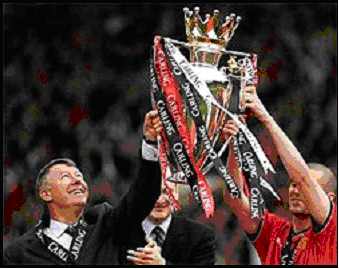
Hat-trick winners Alex Ferguson and Roy Keane